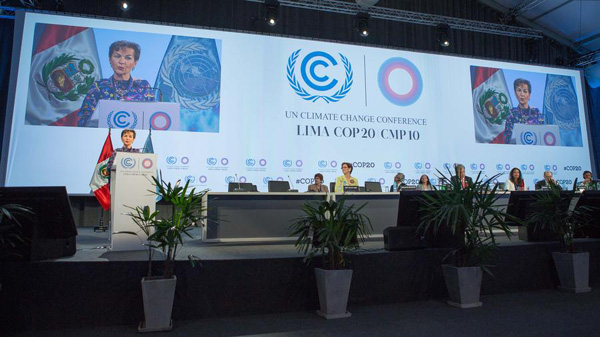 |
|
Representatives attend the opening meeting of the plenary session of the 20th Conference of the Parties (COP 20) of the United Nations Framework Convention on Climate Change (UNFCCC) in Lima, capital of Peru, Dec 1, 2014. The annual UN global climate change talks started in the Peruvian capital of Lima on Monday amid hopes for hammering out a new international climate deal ahead of key talks in Paris in 2015, but this year's talks were expected to be intense. [Photo/Xinhua] |
Historic is a word that most of us use too freely, but the recent announcement of an agreement on climate change between the United States and China is deserving of the term. The fact that the two countries, the world’s largest emitters of carbon dioxide, reached a bilateral agreement on curbing emissions isn’t merely a cause for optimism, it is a timely development that could reinvigorate efforts to tackle a critical and urgent challenge.
The US and China coming together to tackle emissions is important on several levels. In pursuing new targets to reduce carbon emissions by 2025, the US is choosing to go farther and faster than ever before — something that could make a material difference to the amount of carbon released into the atmosphere and could act as an important example to others. Likewise with China, whose undertaking to peak its overall emissions by 2030 is a major development in the fight against climate change. Importantly, the two countries’ commitments are grounded in an understanding of the need to replace coal as a fuel for power generation, and the potential value of carbon capture and storage technology (CCS), clear evidence of both their ambition and pragmatism.
Significantly, it seems fair to hope that the joint commitment by US President Barack Obama and Chinese President Xi Jinping will inject momentum into a much bigger effort. Arguably, we have already seen evidence of that in deliberations by the G20 countries.
Late next year, governments will gather in Paris to sign what is hoped will be an agreement to address climate change. After the disappointment of the previous attempt to agree a deal, in Copenhagen in 2009, no one is taking anything for granted. But building on the impetus of the United Nations secretary-general’s climate summit in New York in September, the US-China accord should encourage policymakers to work harder to secure the global agreement that our planet needs.
There is plenty more to be done. Greater collaboration, for example, is essential. Building a cleaner global energy system that is also capable of meeting growing energy demand is going to involve a lot of efforts by a lot of people.
It is also vital that we root the debate around energy and climate change in pragmatic, commonsense thinking, rather than in the wishful variety. That means, for example, acknowledging the necessity of access to energy, not only for developed countries, where too often we take it for granted, but also in those parts of the world where it is still lacking. The World Bank estimates, for example, that the growth of about 10 million small and medium-sized businesses in Africa is hampered by the lack of available energy. The reality is that the world will need oil and gas to help to meet rising energy demand well into the second half of this century and beyond.